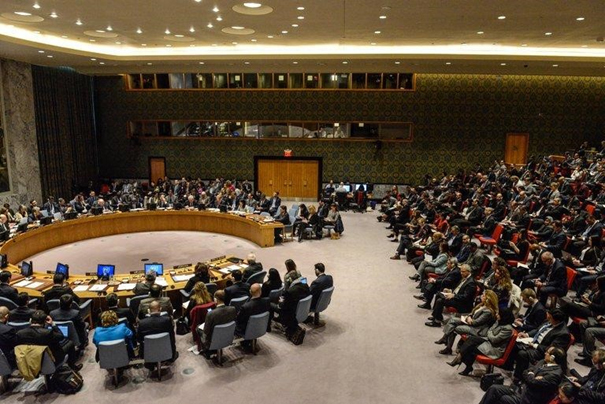

U.S. Vetoes U.N. Resolution Condemning Move on Jerusalem
By Michael Schwirtz And Rick Gladstone
DEC. 18, 2017

A United Nations Security Council meeting on Jerusalem this month. The council’s longtime view has been that no country should establish an embassy in Jerusalem. Credit Stephanie Keith/Getty Images Punctuating America’s increasing international isolation, the United Nations Security Council demanded on Monday that the Trump administration rescind its decisions to recognize Jerusalem as Israel’s capital and to put the United States Embassy there.
The demand, in a resolution that its backers knew would likely offend the United States, was vetoed by the American ambassador, Nikki R. Haley. She was alone.
Even America’s staunchest allies on the 15-member Council, the most powerful body in the United Nations system, voted for the resolution.
They warned that Mr. Trump’s Dec. 6 announcement about Jerusalem, which upended decades of American policy, threatened to subvert the effort to solve one of the world’s most intractable conflicts.
Ignoring the ostracism, Ms. Haley chastised fellow Council members after the midday vote, calling it “an embarrassment” and arguing that Mr. Trump’s decision two weeks ago was a “U.S. recognition of the obvious.”
Any suggestion that the Trump administration’s decision had harmed the peace process was “a scandalous charge,” she said, noting that it was the first time in six years that the United States had used its veto power in the Council.
“Today, for the simple act of deciding where to put our embassy, the United States was forced to defend its sovereignty,” she said. “The record will reflect that we did so proudly.”
The one-page resolution, drafted by Egypt, reiterated the longstanding position of the Security Council, in several resolutions dating back 50 years, rejecting Israel’s sovereignty claim over Jerusalem, the holy city revered by Christians, Jews and Muslims.
Without identifying the United States by name, the resolution also reiterated the Council’s view that no country should establish an embassy in Jerusalem, and that the city’s status was an issue to be resolved by Israel and the Palestinians, who want eastern Jerusalem to be the capital of a future Palestinian state.
In his speech this month announcing plans to move the embassy from Tel Aviv, President Trump called the decision, which had been a key campaign promise, “the right thing to do.” Critics said that in seeking to reward his political base at home, the president potentially sacrificed stability in the Middle East.
Since the announcement, violence in the region has escalated. There have been at least 27 rocket attacks from Gaza and clashes between Israeli security forces and Palestinian demonstrators, along with calls by some for a new Palestinian uprising, Nickolay E. Mladenov, the United Nations special coordinator for the Middle East peace process, told the Security Council.
Israel seized eastern Jerusalem in the 1967 Arab-Israeli war and has declared the entire city to be its eternal and undivided capital. Disagreement over the city’s status has been a central impediment to peace in the region ever since.
Already there are signs that Mr. Trump’s decision has eroded the ability of the United States to act as an impartial arbiter in the peace process.
The Palestinian Authority’s president, Mahmoud Abbas, who had planned to meet Vice President Mike Pence on a visit to Jerusalem this week, canceled that meeting in protest. On Monday afternoon, Mr. Pence postponed his trip until January.
Riyad H. Mansour, the Palestinian ambassador to the United Nations, told the Security Council that the Trump administration’s decision on Jerusalem reflected its “glaring bias” toward Israel and had “undermined its role in any future peace process.”
Israel praised the United States for standing with it. In a video statement posted on Twitter moments after the vote, Benjamin Netanyahu, Israel’s prime minister, compared Ms. Haley to the Maccabees, Jewish fighters whose capture of Jerusalem in the second century B.C. is commemorated during Hanukkah.
“You lit a candle of truth,” he said. “You dispel the darkness. One defeated the many. Truth defeated lies.”
Unlike President Obama, whose relationship with Mr. Netanyahu was tepid at best, Mr. Trump began working to forge a deep relationship with the Israeli government even before taking office.
A month before Mr. Trump’s inauguration, Michael T. Flynn, then the transition team’s national security adviser, contacted several foreign officials at the behest of Mr. Trump’s son-in-law, Jared Kushner, urging them to delay or block a vote on a Security Council resolution that condemned Israel’s construction of settlements, according to emails of transition officials provided or described to The New York Times.
The Obama administration abstained from voting on the measure, allowing it to pass 14 to 0, in what was seen as a pointed rebuke of Israel by its American ally. Mr. Netanyahu and his allies were outraged.
In remarks before the Monday vote, Ms. Haley recalled that abstention last year, describing it as “a stain on America’s conscience.” Given a chance to vote again, she said, the United States would have vetoed that resolution.
The overwhelming message from other Security Council diplomats in the vote on Monday was criticism of the United States, even from strong allies like France and Britain.
Matthew Rycroft, the British ambassador, called the Trump administration’s Jerusalem stance “unhelpful to the prospects for peace in the region.”
Download



















